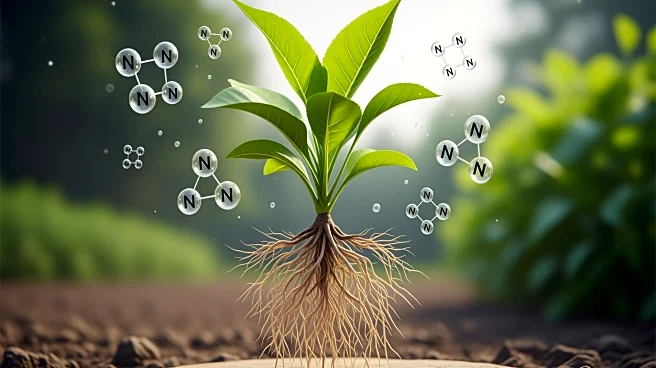What's Happening?
Researchers at Aarhus University have made a significant breakthrough in understanding how certain plants can fix nitrogen from the air, potentially reducing the need for artificial fertilizers. The study,
published in Nature, reveals that small changes in plant receptors can enable symbiosis with nitrogen-fixing bacteria. This discovery could lead to crops like wheat, maize, and rice becoming self-sufficient in nitrogen, decreasing reliance on fertilizers that contribute to global energy consumption and CO2 emissions. The research focused on modifying the plant Lotus japonicus and successfully applied the principle to barley, suggesting broader applications for other cereal crops.
Why It's Important?
The ability to transfer nitrogen-fixing capabilities to major crops could revolutionize agriculture by reducing the environmental impact of fertilizer use. Artificial fertilizers are responsible for significant energy consumption and greenhouse gas emissions. By enabling crops to fix nitrogen naturally, this research could lead to more sustainable farming practices, lower production costs, and reduced pollution. Farmers and agricultural industries stand to benefit from decreased dependency on chemical fertilizers, potentially leading to more eco-friendly and cost-effective food production.
What's Next?
Further research is needed to identify additional genetic keys that enable nitrogen fixation in a wider range of crops. If successful, this could lead to the development of new crop varieties that are self-sufficient in nitrogen, transforming agricultural practices globally. Researchers aim to extend these findings to widely used crops like wheat, corn, and rice, which could significantly impact global food production and environmental sustainability.
Beyond the Headlines
This development raises ethical and ecological questions about genetic modification in agriculture. While the potential benefits are substantial, there is a need for careful consideration of the long-term impacts on ecosystems and biodiversity. The shift towards genetically modified crops could also influence agricultural policies and regulations, necessitating a balanced approach to innovation and environmental stewardship.









